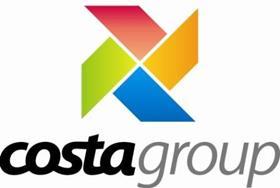
Domestic and international berry growth, an excellent citrus performance and a recovery in the tomato market have translated to year-on-year earnings growth for Costa Group.
The listed Australian company announced its results for the 2017 financial year (12 months ending 25 June 2017, FY2017) earlier this morning, with revenue from the group’s fresh produce segment rising to A$786.2m, up 9.4 per cent on the previous financial year (FY2016). Overall revenue for FY2017 came in at A$909.1m, a 10.7 per cent increase on FY2016, although operating expenses rose to A$810m in FY2017, up from A$747m in FY2016.
“Our core produce categories have delivered solid performances for the year having all exceeded their targets,” explained Costa Group chief executive Harry Debney in release issued to investors via the Australian Securities Exchange (ASX).
Produce gains
Costa continues to reap rewards from the investment it has made in its berry category, with the group posting a 55 per cent increase in blueberry production volumes from FY2016.
“Although average blueberry pricing was marginally lower than FY2016, it was a pleasing outcome, given the significant additional volume which is also reflective of the contribution that our shoulder seasons (which occur between November and June) are now making to our overall performance by enabling 52 week production,” said Debney.
Raspberry production was down following cooler weather at Costa'a Tasmanian farms and some “pest pressure” at its plantations in Far North Queensland.
Optimal count sizes for navel oranges and strong pricing for mandarins helped Costa offset a light citrus crop in 2016. The group continues to strengthen its position in a number of high value citrus export markets, including Japan and the US where it accounted for 47 per cent and 40 per cent of all Australian citrus exports respectively over the 2016 season.
After pricing pressure over FY2016, Costa’s tomato category recovered well, with strong demand for truss tomatoes over the fourth quarter of FY2017. Snacking and cocktail tomatoes are becoming the mainstays of the company’s tomato portfolio, with this segment making up 70 per cent of Costa’s production area.
The acquisition of the Avocado Ridge operation in Queensland in January 2017 has boosted Costa’s involvement in this category, with the company eyeing further growth over coming seasons.
“During FY2017 we began to execute our strategy to become the market leader in avocados with the acquisition of avocado farms in Queensland. In parallel, Costa has also expanded its avocado marketing volumes by circa 36 per cent which has further enhanced our offering in this category,” said Mr Debney.
Going global
Offshore, Costa recorded a 47.2 per cent increase on transacted sales from its international segment, which encompasses berry operations in Morocco (African Blue) and China.
FY2017 marked Costa’s first full year of berry farming in China, which Debney said had been positive with the company achieving a modest profit. African Blue had another productive year, with sales volume increasing by around 50 per cent, despite hot weather at the end of the season impacting quality.
Looking ahead
Costa issued a final dividend of A$0.07 per share to investors, bringing the full year FY2017 dividend to A$0.11 per share, a 22 per cent improvement on FY2016.
Looking ahead to FY2018, the group has set its sights on consolidating their position in a number of key categories and establishing platforms for further growth.
“This includes blueberry substrate production at Corindi and mushroom capacity expansion,” according to the release. “Due to the seasonality of avocados and further expansion in China and Morocco, earnings will be further weighted towards the second half of FY2018.”






No comments yet